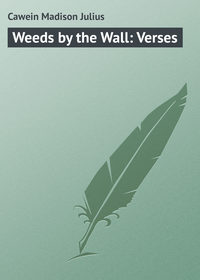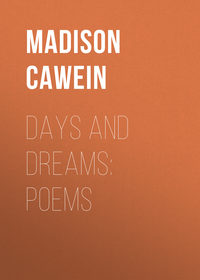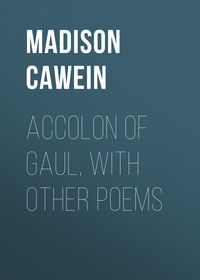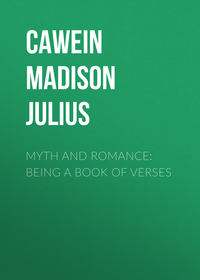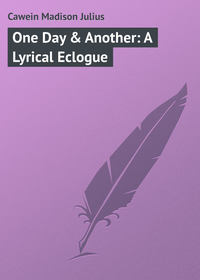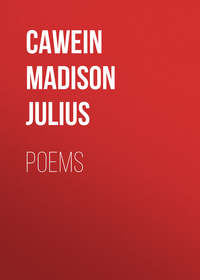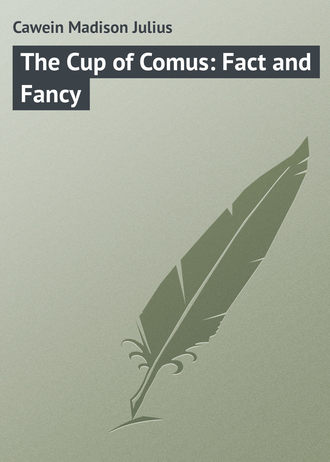 полная версия
полная версияThe Cup of Comus: Fact and Fancy

Madison J. Cawein
The Cup of Comus: Fact and Fancy
THRENODY IN MAY
(In memory of Madison Cawein.)Again the earth, miraculous with May,Unfolds its vernal arras. YesteryearWe strolled together 'neath the greening trees,And heard the robin tune its flute note clear,And watched above the white cloud squadrons veer.And saw their shifting shadows drift awayAdown the Hudson, as ships seek the seas.The scene is still the same. The violetUnlids its virgin eye; its amber oreThe dandelion shows, and yet, and yet,He comes no more, no more!He of the open and the generous heart,The soul that sensed all flowerful loveliness,The nature as the nature of a child;Who found some rapture in the wind's caress.Beauty in humble weed and mint and cress.And sang, with his incomparable art,The magic wonder of the wood and wild.The little people of the reeds and grassMurmur their blithe, companionable lore,The rills renew their minstrelsy. Alas,He comes no more, no more!And yet it seems as though he needs must come,Albeit he has cast off mortality,Such was his passion for the bourgeoning time,Such to his spirit was the ecstasyThe hills and valleys chorus when set free,No music mute, no lyric instinct dumb,But keyed to utterance of immortal rhyme.Ah, haply in some other fairer springHe sees bright tides sweep over slope and shore,But here how vain is ell my visioning!He comes no more, no more!Poet and friend, wherever you may fareEnwrapt in dreams, I love to think of youWandering amid the meads of asphodel,Holding high converse with the exalted fewWho sought and found below the elusive clueTo beauty, and in that diviner airBowing in worship still to its sweet spell.Why sorrow, then, though fate unkindly laysUpon our questioning hearts this burden sore,And though through all our length of hastening daysHe comes no more, no more!Clinton Scollard.FOREWORD
It is with a sense of sadness and regret that this book, written by one who universally has endeared himself to lovers of nature through his revelation of her mysteries, must be prefaced as containing the last songs of this exquisite singer of the South.
When the final word is spoken it is fitting that it be by one of authority. William Dean Howells, in the pages of The North American Review, offers this tribute:
"I had read his poetry and loved it from the beginning, and in each successive expression of it, I had delighted in its expanding and maturing beauty. Between the earliest and the latest thing there may have been a hundred different things in the swan-like life of a singer … but we take the latest as if it summed him up in motive and range and tendency… Not one of his lovely landscapes but thrilled with a human presence penetrating to it from his most sensitive and subtle spirit until it was all but painfully alive with memories, with regrets, with longings, with hopes, with all that from time to time mutably constitutes us men and women, and yet keeps us children. He has the gift, in a measure, that I do not think surpassed in any poet, of touching some commonest thing in nature, and making it live, from the manifold associations in which we have our being, and glow thereafter with an indistinguishable beauty… No other poet can outword this poet when it comes to choosing some epithet fresh from the earth and air, and with the morning sun and light upon it, for an emotion or an experience in which the race renews its youth from generation to generation… His touch leaves everything that was dull to the sense before glowing in the light of joyful recognition."
With a tone of conviction Edwin Markham says:
"No other poet of the later American choir offers so large a collection of verse as Mr. Cawein does, and no other American minstrel has so unvarying a devotion to nature. And none other, perhaps, has so keen an eye, so sure a word for nature's magic of mood, her trick of color, her change of form. He is not so wild and far-flying as Bliss Carmen, nor so large and elemental as Joaquin Miller; but he is often as delicate and eerie as Aldrich, and sometimes as warm and rich as Keats in the April affluence of 'Endymion.'"
"Mr. Cawein's landscape is not the sea, nor the desert, nor the mountain, but the lovely inland levels of his Kentucky. His work is almost wholly objective. A dash more of human import mixed into the beauty and melody of his poetry would rank him with Lowell and the other great lyrists of our elder choir."
Some of the new poems portray a high moral passion, potent with the belief of life beyond, where his delicacy of vision penetrates the shadow and seems to have sighted the shore that has given his soul greeting "somewhere yonder in a world uncharted."
Clear, sure, and strong is the vocal loveliness and inevitable word with which this poet endears the little forms of life in the field of Faery. The "Song of Songs" (1913) could be characterized as prophecy, by one in whom seemed inherent the fatal instinct of the predestined. He sought for "Song to lead her way above the crags of wrong," and he gave
"Such music as a birdGives of its soul when dyingUnconscious if it's heard!"And so he went, singing, to his "Islands of Infinity."Rose de Vaux-Royer.This edition is called the Friendship Edition, as it carries in its significance a testimonial of love and admiration for the author, extended by those who wish his last collected poems preserved for futurity.
Acknowledgment is due W. D. Howells, The North American Review, The Macmillan Co., Clinton Scollard and Edwin Markham for their courtesy.
BROKEN MUSIC
(IN MEMORIAM)There it lies broken, as a shard, —What breathed sweet music yesterday;The source, all mute, has passed awayWith its masked meanings still unmarred.But melody will never cease!Above the vast cerulean seaOf heaven, created harmonyRings and re-echoes its release!So, thin dumb instrument that liesAll powerless, – [with spirit flown,Beyond the veil of the UnknownTo chant its love-hymned litanies, – ]Though it may thrill us here no moreWith cadenced strain, – in other spheresWill rise above the vanquished yearsAnd breathe its music as before![Louisville Times]Written December 7th, 1914.Rose de Vaux-Royer.The spirit of Madison Cawein passed at midnight from this world of intimate beauty "To stand a handsbreadth nearer Heaven and what is God!"
MADISON CAWEIN
(1865-1914)The wind makes moan, the water runneth chill;I hear the nymphs go crying through the brake;And roaming mournfully from hill to hillThe maenads all are silent for his sake!He loved thy pipe, O wreathed and piping Pan!So play'st thou sadly, lone within thine hollow;He was thy blood, if ever mortal man,Therefore thou weepest – even thou, Apollo!But O, the grieving of the Little Things,Above the pipe and lyre, throughout the woods!The beating of a thousand airy wings,The cry of all the fragile multitudes!The moth flits desolate, the tree-toad calls,Telling the sorrow of the elf and fay;The cricket, little harper of the walls,Puts up his harp – hath quite forgot to play!And risen on these winter paths anew,The wilding blossoms make a tender sound;The purple weed, the morning-glory blue,And all the timid darlings of the ground!Here, here the pain is sharpest! For he walkedAs one of these – and they knew naught of fear,But told him daily happenings and talkedTheir lovely secrets in his list'ning ear!Yet we do bid them grieve, and tell their grief;Else were they thankless, else were all untrue;O wind and stream, O bee and bird and leaf,Mourn for your poet, with a long adieu!Margaret Steele Anderson. Louisville Post, December 12th, 1914.THE CUP OF COMUS
PROEMThe Nights of song and story,With breath of frost and rain,Whose locks are wild and hoary,Whose fingers tap the paneWith leaves, are come again.The Nights of old October,That hug the hearth and tell,To child and grandsire sober,Tales of what long befellOf witch and warlock spell.Nights, that, like gnome and faery,Go, lost in mist and moon.And speak in legendaryThoughts or a mystic rune,Much like the owlet's croon.Or whirling on like witches,Amid the brush and broom,Call from the Earth its riches,Of leaves and wild perfume,And strew them through the gloom.Till death, in all his starkness,Assumes a form of fear,And somewhere in the darknessSeems slowly drawing nearIn raiment torn and sere.And with him comes November,Who drips outside the door,And wails what men rememberOf things believed no more,Of superstitious lore.Old tales of elf and dæmon,Of Kobold and of Troll,And of the goblin womanWho robs man of his soulTo make her own soul whole.And all such tales, that glamouredThe child-heart once with fright,That aged lips have stammeredFor many a child's delight,Shall speak again to-night.To-night, of moonlight minted,That is a cup divine,Whence Death, all opal-tinted, —Wreathed red with leaf and vine, —Shall drink a magic wine.A wonder-cup of Comus,That with enchantment streams,In which the heart of Momus, —That, moon-like, glooms and gleams,Is drowned with all its dreams.THE INTRUDER
There is a smell of roses in the roomTea-roses, dead of bloom;An invalid, she sits there in the gloom,And contemplates her doom.The pattern of the paper, and the grain.Of carpet, with its stain,Have stamped themselves, like fever, on her brain,And grown a part of pain.It has been long, so long, since that one died,Or sat there by her side;She felt so lonely, lost, she would have cried, —But all her tears were dried.A knock came on the door: she hardly heard;And then – a whispered word,And someone entered; at which, like a bird,Her caged heart cried and stirred.And then – she heard a voice; she was not wrong:His voice, alive and strong:She listened, while the silence filled with song —Oh, she had waited long!She dared not turn to see; she dared not look;But slowly closed her book,And waited for his kiss; could scarcely brookThe weary time he took.There was no one remembered her – no one!But him, beneath the sun, —Who then had entered? entered but to shunHer whose long work was done.She raised her eyes, and – no one! – Yet she feltA presence near, that smeltLike faded roses; and that seemed to meltInto her soul that knelt.She could not see, but knew that he was there,Smoothing her hands and hair;Filling with scents of roses all the air,Standing beside her chair.* * * *And so they found her, sitting quietly,Her book upon her knee,Staring before her, as if she could see —What was it – Death? or he?A GHOST OF YESTERDAY
There is a house beside a way,Where dwells a ghost of Yesterday:The old face of a beauty, faded,Looks from its garden: and the shadedLong walks of locust-trees, that seemForevermore to sigh and dream,Keep whispering low a word that's true,Of shapes that haunt its avenue,Clad as in days of belle and beau,Who come and goAround its ancient portico.At first, in stock and beaver-hat,With flitting of the moth and bat,An old man, leaning on a cane,Comes slowly down the locust lane;Looks at the house; then, groping, goesInto the garden where the roseStill keeps sweet tryst with moth and moon;And, humming to himself a tune,– "Lorena" or "Ben Bolt" we'll say, —Waits, bent and gray,For some fair ghost of Yesterday.The Yesterday that holds his all —More real to him than is the wallOf mossy stone near which he stands,Still reaching out for her his hands —For her, the girl, who waits him there,A lace-gowned phantom, dark of hair,Whose loveliness still keeps those walks,And with whose Memory he talks;Upon his heart her happy head, —So it is said, —The girl, now half a century dead.LORDS OF THE VISIONARY EYE
I came upon a pool that shone,Clear, emerald-like, among the hills,That seemed old wizards round a stoneOf magic that a vision thrills.And as I leaned and looked, it seemedVague shadows gathered there and here —A dream, perhaps the water dreamedOf some wild past, some long-dead year…A temple of a race unblessedRose huge within a hollow land,Where, on an altar, bare of breast,One lay, a man, bound foot and hand.A priest, who served some hideous god,Stood near him on the altar stair,Clothed on with gold; and at his nodA multitude seemed gathered there.I saw a sword descend; and thenThe priest before the altar turned;He was not formed like mortal man,But like a beast whose eyeballs burned.Amorphous, strangely old, he glaredAbove the victim he had slain,Who lay with bleeding bosom bared,From which dripped slow a crimson rain.Then turned to me a face of stoneAnd mocked above the murdered dead,That fixed its cold eyes on his ownAnd cursed him with a look of dread.And then, it seemed, I knew the place,And how this sacrifice befell:I knew the god, the priest's wild face,I knew the dead man – knew him well.And as I stooped again to look,I heard the dark hills sigh and laugh,And in the pool the water shookAs if one stirred it with a staff.And all was still again and clear:The pool lay crystal as before,Temple and priest were gone; the mereHad closed again its magic door.A face was there; it seemed to shineAs round it died the sunset's flame —The victim's face? – or was it mine? —They were to me the very same.And yet, and yet – could this thing be? —And in my soul I seemed to know,At once, this was a memoryOf some past life, lived long ago.Recorded by some secret sense,In forms that we as dreams retain;Some moment, as experience,Projects in pictures on the brain.THE CREAKING DOOR
Come in, old Ghost of all that used to be! —You find me old,And love grown cold,And fortune fled to younger company:Departed, as the glory of the day,With friends! – And you, it seems, have come to stay. —'T is time to pray.Come; sit with me, here at Life's creaking door,All comfortless. —Think, nay! then, guess,What was the one thing, eh? that made me poor? —The love of beauty, that I could not bind?My dream of truth? or faith in humankind? —But, never mind!All are departed now, with love and youth,Whose stay was brief;And left but griefAnd gray regret – two jades, who tell the truth; —Whose children – memories of things to be,And things that failed, – within my heart, ah me!Cry constantly.None can turn time back, and no man delayDeath when he knocks, —What good are clocks,Or human hearts, to stay for us that dayWhen at Life's creaking door we see his smile, —Death's! at the door of this old House of Trial? —Old Ghost, let's wait awhile.AT THE END OF THE ROAD
This is the truth as I see it, my dear,Out in the wind and the rain:They who have nothing have little to fear, —Nothing to lose or to gain.Here by the road at the end o' the year,Let us sit down and drink o' our beer,Happy-Go-Lucky and her cavalier,Out in the wind and the rain.Now we are old, oh isn't it fineOut in the wind and the rain?Now we have nothing why snivel and whine? —What would it bring us again? —When I was young I took you like wine,Held you and kissed you and thought you divine —Happy-Go-Lucky, the habit's still mine,Out in the wind and the rain.Oh, my old Heart, what a life we have led,Out in the wind and the rain!How we have drunken and how we have fed!Nothing to lose or to gain! —Cover the fire now; get we to bed.Long was the journey and far has it led:Come, let us sleep, lass, sleep like the dead,Out in the wind and the rain.THE TROUBADOUR OF TREBIZEND
Night, they say, is no man's friend:And at night he met his endIn the woods of Trebizend.Hate crouched near him as he strodeThrough the blackness of the road,Where my Lord seemed some huge toad.Eyes of murder glared and burnedAt each bend of road he turned,And where wild the torrent churned.And with Death we stood and staredFrom the bush as by he fared, —But he never looked or cared.He went singing; and a roseLay upon his heart's repose —With what thought of her – who knows?He had done no other wrongSave to sing a simple song,"I have loved you – loved you long."And my lady smiled and sighed;Gave a rose and looked moist eyed,And forgot she was a bride.My sweet lady, Jehan de Grace,With the pale Madonna face,He had brought to his embrace.And my Lord saw: gave commands:I was of his bandit bands. —Love should perish at our hands.Young the Knight was. He should singNevermore of love or spring,Or of any gentle thing.When he stole at midnight's hour,To my Lady's forest bower,We were hidden near the tower.In the woods of TrebizendThere he met an evil end. —Night, you know, is no man's friend.He has fought in fort and field;Borne for years a stainless shield,And in strength to none would yield.But we seized him unaware,Bound and hung him; stripped him bare,Left him to the wild boars there.Never has my Lady known. —But she often sits alone,Weeping when my Lord is gone…Night, they say, is no man's friend. —In the woods of TrebizendThere he met an evil end.Now my old Lord sleeps in peace,While my Lady – each one sees —Waits, and keeps her memories.GHOSTS
Low, weed-climbed cliffs, o'er which at noonThe sea-mists swoon:Wind-twisted pines, through which the crowGoes winging slow:Dim fields, the sower never sows,Or reaps or mows:And near the sea a ghostly house of stoneWhere all is old and lone.A garden, falling in decay,Where statues grayPeer, broken, out of tangled weedAnd thorny seed:Satyr and Nymph, that once made loveBy walk and grove:And, near a fountain, shattered, green with mold,A sundial, lichen-old.Like some sad life bereft,To musing left,The house stands: love and youthBoth gone, in sooth:But still it sits and dreams:And round it seemsSome memory of the past, still young and fair,Haunting each crumbling stair.And suddenly one dimly sees,Come through the trees,A woman, like a wild moss-rose:A man, who goesSoftly: and by the dialThey kiss a while:Then drowsily the mists blow round them, wan,And they, like ghosts, are gone.THE LONELY LAND
A river binds the lonely land,A river like a silver band,To crags and shores of yellow sand.It is a place where kildees cry,And endless marches eastward lie,Whereon looks down a ghostly sky.A house stands gray and all aloneUpon a hill, as dim of tone,And lonely, as a lonely stone.There are no signs of life about:No barnyard bustle, cry and shoutOf children who run laughing out.No crow of cocks, no low of cows,No sheep-bell tinkling under boughsOf beech, or song in garth or house.Only the curlew's mournful call,Circling the sky at evenfall,And loon lamenting over all.A garden, where the sunflower diesAnd lily on the pathway lies,Looks blindly at the blinder skies.And round the place a lone wind blows,As when the Autumn grieving goes,Tattered and dripping, to its close.And on decaying shrubs and vinesThe moon's thin crescent, dwindling shines,Caught in the claws of sombre pines.And then a pale girl, like a flower,Enters the garden: for an hourShe waits beside a wild-rose bower.There is no other one around;No sound, except the cricket's soundAnd far-off baying of a hound.There is no fire or candle-lightTo flash its message through the nightOf welcome from some casement bright.Only the moon, that thinly throwsA shadow on the girl and rose,As to its setting slow it goes.And when 'tis gone, from shore and streamThere steals a mist, that turns to dreamThat place where all things merely seem.And through the mist there goes a cry,Not of the earth nor of the sky,But of the years that have passed by.And with the cry there comes the rain,Whispering of all that was in vainAt every door and window-pane.And she, who waits beside the rose,Hears, with her heart, a hoof that goes,Galloping afar to where none knows.And then she bows her head and weeps…And suddenly a shadow sweepsAround, and in its darkening deeps.The house, the girl, the cliffs and streamAre gone. – And they, and all things seemBut phantoms, merely, in a dream.THE WIND WITCH
The wind that met her in the park,Came hurrying to my side —It ran to me, it leapt to me,And nowhere would abide.It whispered in my ear a word,So sweet a word, I swear,It smelt of honey and the kissIt'd stolen from her hair.Then shouted me the flowery wayWhereon she walked with dreams,And bade me wait and watch her passAmong the glooms and gleams.It ran to meet her as she cameAnd clasped her to its breast;It kissed her throat, her chin, her mouth,And laughed its merriest.Then to my side it leapt again,And took me by surprise:The kiss it'd stolen from her lipsIt blew into my eyes.Since then, it seems, I have grown blindTo every face but hers:It haunts me sleeping or awake,And is become my curse.The spell, that kiss has laid on me,Shall hold my eyes the same,Until I give it back againTo lips from which it came.OLD GHOSTS
Clove-spicy pinks and phlox that fill the senseWith drowsy indolence;And in the evening skiesInterior splendor, pregnant with surprise,As if in some new wiseThe full moon soon would rise.Hung with the crimson aigrets of its seedsThe purple monkshood bleeds;The dewy crickets chirr,And everywhere are lights of lavender;And scents of musk and myrrhTo guide the foot of her.She passes like a misty glimmer onTo where the rose blooms wan, —A twilight moth in flight, —As in the west its streak of chrysoliteThe dusk erases quite,And ushers in the night.And now another shadow passes slow,With firefly light a-glow:The scent of a cigar,And two who kiss beneath the evening-star,Where, in a moonbeam bar,A whippoorwill cries afar.Again the tale is told, that has been toldSo often here of old:Ghosts of dead lovers they?Or memories only of some perished day? —Old ghosts, no time shall lay,That haunt the place alway.THE NAME ON THE TREE
I saw a name carved on a tree – "Julia";A simpler name there could not be – Julia:But seeing it I seemed to seeA Devon garden, – pleasantlyAbout a parsonage, – the beeMade drowsy-sweet; where rosemaryAnd pink and phlox and peonyBowed down to oneWhom Herrick made to bloom in Poetry.A moment there I saw her stand, – Julia;A gillyflower in her hand, – Julia:And then, kind-faced and big and bland,As raised by some magician's wand,Herrick himself passed by, sun-tanned,And smiling; and the quiet landSeemed to take on and understandA dream long dreamed,And for the lives of two some gladness planned.And then I seemed to hear a sigh, – "Julia!"And someone softly walking nigh, – Julia:The leaves shook; and a butterflyTrailed past; and through the sleepy skyA bird flew, crying strange its cry —Then suddenly before my eyeTwo lovers strolled – They knew not whyI looked amazed, —But I had seen old ghosts of long dead loves go by.THE HAUNTED GARDEN
There a tattered marigoldAnd dead asters manifold,Showed him where the garden oldOf time bloomed:Briar and thistle overgrewCorners where the rose once blew,Where the phlox of every hueLay entombed.Here a coreopsis flowerPushed its disc above a bower,Where once poured a starry shower,Bronze and gold:And a twisted hollyhock,And the remnant of a stock,Struggled up, 'mid burr and dock,Through the mold.Flower-pots, with mossy cloak,Strewed a place beneath an oak,Where the garden-bench lay brokeBy the tree:And he thought of her, who hereSat with him but yesteryear;Her, whose presence now seemed nearStealthily.And the garden seemed to lookFor her coming. Petals shookOn the spot where, with her book,Oft she sat. —Suddenly there blew a wind:And across the garden blind,Like a black thought in a mind,Stole a cat.Lean as hunger; like the shadeOf a dream; a ghost unlaid;Through the weeds its way it made,Gaunt and old:Once 't was hers. He looked to seeIf she followed to the tree. —Then recalled how long since sheHad been mold.THE CLOSED DOOR


